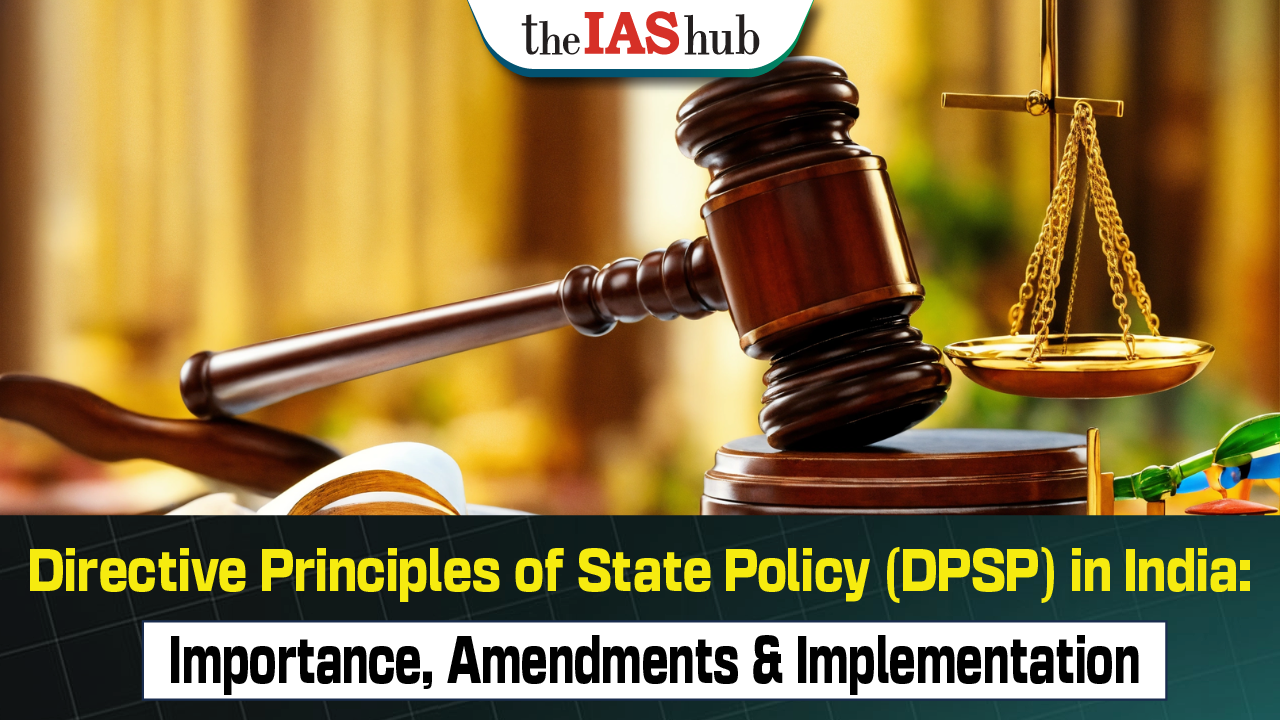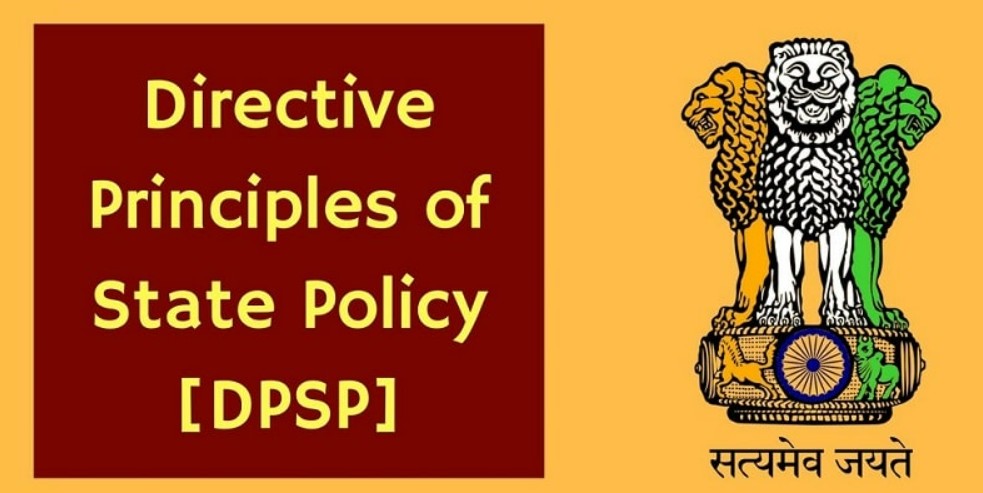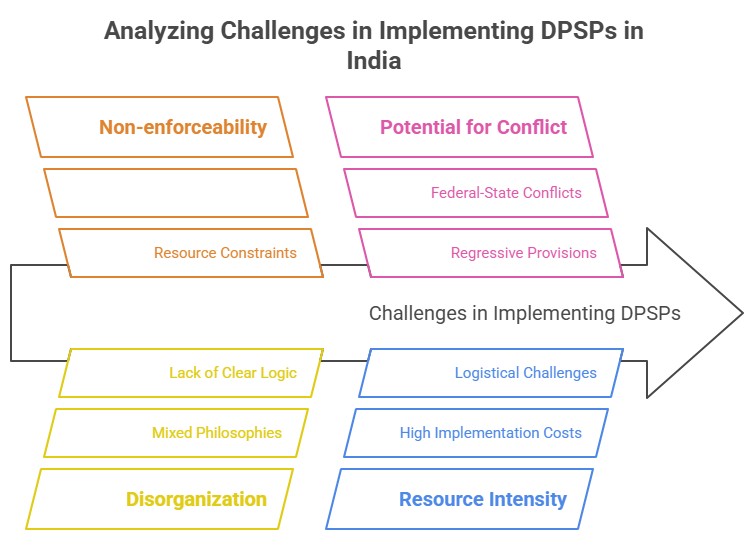Learn about India’s Directive Principles of State Policy (DPSP), their role in promoting social and economic justice, key amendments, schemes like MGNREGA & PMJDY, and challenges in harmonizing with Fundamental Rights.


The Directive Principles of State Policy (DPSP) in India are derived from the Irish constitution and are a set of guiding principles for the government. The Directive Principles resemble the "Instrument of Instructions" in the Government of India Act, 1935.

|
Case Name |
Year |
Outcome |
|
Champakam Dorairajan Case |
1951 |
SC held that the Directive Principles are not enforceable by court as per Article 37. Fundamental Rights have supremacy over Directive Principles. |
|
Golak Nath Case |
1967 |
SC declared that Fundamental Rights cannot be abridged or diluted in order to implement the Directive Principles. |
|
Kesavananda Bharati Case |
1973 |
SC ruled that the Parliament can amend any part of the Constitution, including Fundamental Rights, but cannot alter its basic structure. |
|
Minerva Mills Case |
1980 |
SC emphasized the harmony between Part III (Fundamental Rights) and Part IV (Directive Principles), considering them as two wheels of the chariot in establishing an egalitarian social order. |
|
Key idea |
Importance |
|
Fundamental to governance |
Essential for country's governance (Art. 37). |
|
Idea of welfare state |
Introduces concept of welfare state. |
|
Guidance to legislatures |
Sets ideal for policy and law making. |
|
Reflection of Preamble |
Aims for social, economic, political justice. |
|
Four pillars of Indian Constitution |
Supports Justice, Liberty, Equality, Fraternity. |

|
DPSP Article |
Program/Initiative |
|
Article 38 |
Mahatma Gandhi National Rural Employment Guarantee Act (MGNREGA), Pradhan Mantri Jan Dhan Yojana (PMJDY), MUDRA scheme |
|
Article 39A |
National Legal Services Authority (NALSA) to aid poor people |
|
Article 39 |
Pradhan Mantri Kaushal Vikas Yojana (PMKVY), Skill India, Deen Dayal Upadhyaya Grameen Kaushalya Yojana (DDU-GKY) |
|
Article 40 |
73rd and 74th Amendment, PM Adarsh Gram Yojna, Aspirational District Programs |
|
Article 41 |
Mid-Day Meal Scheme, National Rural Livelihood Mission (NRLM), Rights of Persons with Disabilities Act, 2016 |
|
Article 42 |
Maternity Benefit Act, Factories Act, Minimum Wages Act |
|
Article 43 |
Minimum Wages Act, Code on Wages, 2019 |
|
Article 44 |
Abolition of Triple Talaq, UCC in Goa |
|
Article 45 |
Sarva Shiksha Abhiyan |
|
Article 46 |
Reservation of SC, ST & OBCs, EWS |
|
Article 47 |
National Health Mission, Swachh Bharat Abhiyan, Poshan Abhiyaan, Prohibition on Alcohol in states like Bihar, Gujrat |
|
Article 48 |
Beef Ban across multiple states |
|
Article 49 |
Adopt a Heritage Scheme, National Museum, Indira Gandhi National Centre for the Arts |
|
Article 50 |
Striking down of NJAC by Supreme Court |
Uniform Civil Code: A Uniform Civil Code is one that would provide for one law for the entire country, applicable to all religious communities in their personal matters such as marriage, divorce, inheritance, adoption, etc.
Merits/Demerits and Challenges of Implementing UCC:
|
Merits |
Demerits |
Challenges |
|
Gender Equality |
Potential Erosion of Diversity |
Harmonizing Diverse Personal Laws |
|
National Integration |
Community Identity Concerns |
Addressing Cultural Sensitivities |
|
Simplification of Legal System |
Perceived Majoritarian Imposition |
Resistance from Religious Groups |
|
Reducing Gender-Based Discrimination |
Loss of Customary Laws |
Achieving Consensus among Stakeholders |
|
Streamlining Adoption and Marriage Laws |
Fear of Cultural Homogenization |
Balancing Gender Justice with Traditions |
|
Promoting Secularism |
May Create Initial Social Unrest |
Implementation and Enforcement |
|
Legal Clarity and Certainty |
Risk of Oversimplification |
Educating the Masses on New Laws |
|
Rationalization of Personal Laws and Protection of Individual Rights |
Possible Legal Loopholes |
Addressing Regional Differences and Consideration of Tribal Laws |

|
Case Name |
Year |
Outcome and Remarks |
|
Shah Bano Case |
1985 |
|
|
Sarla Mudgal Case |
1995 |
|
|
Ahmedabad Women Action Group (AWAG) v. Union of India |
1997 |
|
|
Shabnam Hashmi v. Union of India |
2014 |
|
|
Shayara Bano v. Union of India (Triple Talaq Case) |
2017 |
|
|
Topic |
Key Points |
|
Right To Health |
Recently, the Rajasthan Govt. announced a Right to Health bill, raising concerns about challenges of effective delivery of such right |
|
Affordable and Accessible Judicial System |
|
|
Free Legal Aid to People |
|
|
Environmental Protection (Article 48A) |
|
Balancing Fundamental Rights and Directive Principles for Social Order and Empowerment:


Refine your answer writing skills and elevate your UPSC preparation with personalized support and expert feedback.
Fill out the form to get started with the program or any other enquiries !








Are you dreaming of becoming an IAS officer? Then, IAShub can be your best guide. It is one of the Best IAS Coaching in Delhi. Many students who want to clear the UPSC exam join IAShub for learning. The institute gives both online and offline classes. Their teachers are experienced and helpful. They easily explain every topic. Students also get notes, tests, and tips to do well in the exam.
IAShub is in Delhi and is trusted by many UPSC students. It offers coaching for every part of the UPSC exam – Prelims, Mains, and Interview. The classes are simple and easy to understand. The teachers are experts and guide students in the right way. IAShub is also known for its helpful notes, test series, and answer-writing practice. IAShub is the best coaching in Delhi and also gives UPSC Online Classes. This helps students from any place in India to learn. The online classes are live and also recorded. So, students can watch them anytime. These classes cover the full UPSC syllabus.
Here are some important services provided by IAShub:
The UPSC Civil Services Exam has three parts:
This exam is tough, but with the right guidance, it becomes easy to manage. Students must study smart and stay regular.
IAShub supports students from the beginning to the end. It gives the right books, tests, and notes. The classes are easy to follow, and the teachers are always ready to help. Students get personal doubt sessions too. The test series and answer checking help students learn where they need to do better. Also, free study materials save time and money.
IAShub also guides students during the final stage – the interview. Experts take mock interviews and give useful tips. This full support makes IAShub one of the best IAS coaching in Delhi.